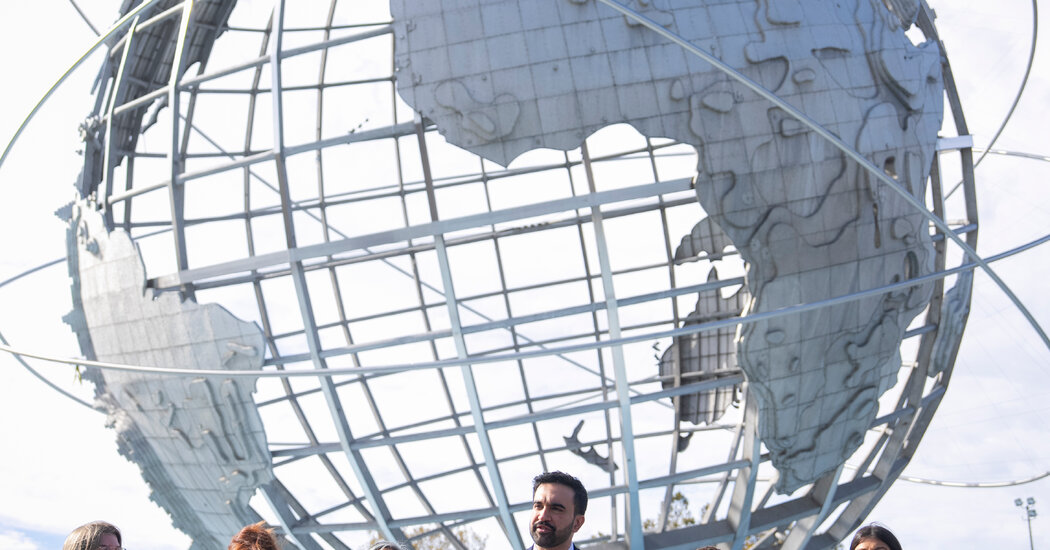Zohran Mamdani’s African roots
A year ago, hardly anyone knew about Zohran Mamdani. As of this week, he is not just the mayor-elect of New York City but something of a global celebrity for progressives and young people.
Mamdani is charismatic. At 34, he’s a natural at viral video. And he’s a democratic socialist who won in the global capital of finance.
He’s also an immigrant, with family ties to Uganda and India, who will soon occupy the most prominent office in one of the most international cities on the planet.
Mamdani spent most of his childhood in Morningside Heights in Manhattan. But he was born in Uganda to a family of Muslim immigrants from India, and lived there for the first five years of his life.
My colleague Abdi Latif Dahir has been reporting on Mamdani’s roots, talking to people who knew the Mamdani family and knew him as a child. It was in Africa, Abdi told me, that the mayor-elect got his first exposure to the divisive power of wealth and race — forces that still animate his policy agenda and shape his values today.
Privilege in a poor country
The Mamdani family lived in a leafy neighborhood overlooking Uganda’s capital, Kampala, and still owns a house there. (Mamdani recently celebrated his wedding at the property.) His parents are both intellectuals: Mahmood Mamdani taught post-colonial studies at the country’s oldest and most prestigious university; his mother is the filmmaker Mira Nair.
Mamdani has been open about his privileged background, saying he “never had to want for something” as a child. But this privilege emerged from a tense environment.
In Uganda, the South Asian community is wealthier on average than Black Ugandans, and in some cases, spectacularly wealthy. In 1972, the country’s despotic ruler Idi Amin expelled thousands of South Asians, accusing them of disloyalty and economic exploitation. One of them was Mamdani’s father, Mahmood.
We can’t know exactly how that event shaped Mamdani. (Mamdani hasn’t responded to Abdi’s requests for an interview so far.) “But it’s impossible to ignore its shadow over Ugandan history,” Abdi said.
It’s hard to be Indian in Uganda and not be aware of the strife caused by extreme inequality. Mamdani grew up in a family intimately shaped by the legacy of empire and its racial divisions. His childhood also included a brief stint in South Africa shortly after apartheid.
Once, at his school in Kampala, Mamdani’s teacher asked the Indian students in his class to raise their hands. Mamdani refused. “I am not Indian, I am Ugandan,” he said, according to an account from his father’s book, which Abdi read.
Before he was a politician, Mamdani made music with a Ugandan childhood friend. (Check out this clip Abdi sent me if you want a sense of the new mayor-elect’s rap skills.) The music explicitly touches on the lingering impact of colonialism in Uganda today.
Reactions around the world
Mamdani’s policy agenda is focused on affordability. He has run on free buses, universal child care, city-owned grocery stores and a rent freeze on rent-stabilized apartments.
He has also campaigned on what my colleague Nicholas Fandos has called an “unapologetically pro-Palestinian platform.”
If his roots and upbringing shaped some of that platform, it’s also worth pointing out that the democratic socialism Mamdani subscribes to is increasingly influential in the Democratic Party. And support for Israel has plummeted across the political spectrum in the U.S. since the war in Gaza.
What’s clear is that Mamdani’s roots have allowed some people around the world, including Bollywood fans in India and young women in Turkey, to see a bit of themselves in him, as my colleague Dionne Searcey reports.
In Uganda, as it happens, few have heard of him. And in Israel, where there have been concerns about Mamdani’s pro-Palestinian advocacy, his victory has generated a strong reaction. “The Big Apple has fallen,” one right-wing lawmaker said. Among Palestinians, his victory was hailed as a milestone.
A handful of international publications have even invoked comparisons to a certain other American political figure with African roots. But unlike Barack Obama, Mamdani was born in Africa — and so he can never run for president.
For more:
-
A day after his monumental victory, Mamdani turned his attention to how he would lead and named a transition team. We have live updates.
-
Also on Tuesday, Democrats won statewide elections in Virginia, New Jersey, California and Pennsylvania, sending a warning sign to President Trump and his Republican Party. Here are takeaways.
Interested in providing feedback on this newsletter? Take our short survey here.
MORE TOP NEWS
Escaping from killer drones
Russia and Ukraine both operate remotely piloted drones that watch over the battlefield and pursue targets on sight. But in this new form of warfare, luck still plays a role.
When groups of soldiers are spotted, most drones cannot strike them all. A pilot must decide: This man? That one? The fleeing soldier who tripped, becoming an easy kill? Or the pair running together who might be felled with one strike?
My colleague C.J. Chivers reported from the Kharkiv region on how rescuing Ukrainian soldiers from the drone-infested front lines has never been more difficult.
OTHER NEWS
-
The U.S. Supreme Court showed skepticism about Trump’s use of emergency powers to impose far-reaching tariffs.
-
Trump’s move to slash refugee arrival numbers has ricocheted widely, crushing hopes and dreams.
-
Venezuela has an arsenal of Russian weapons and armed civilians ready to respond to any potential attack from the U.S.
-
A senior Israeli officer was arrested for authorizing the leak of footage showing soldiers allegedly abusing a Palestinian detainee.
-
France moved to block access to the online retailer Shein for selling child sex dolls.
-
Meet the 38-year-old who could become the next Dutch prime minister.
-
Brazil is set to announce a new climate fund that would pay countries to keep their tropical forests intact.
-
Activists say China’s legal system is failing victims of domestic violence because of a lack of resources and political will.
-
Mexico’s president said she is pressing charges against a man who groped her on the street — a shocking encounter that was captured on video.
SPORTS
Premier League: A Tottenham defender may have scored the goal of the season.
Formula 1: Gabriel Bortoleto, competing in his home country, will make his case to be rookie of the year.
IMAGE OF THE DAY
— A Japanese museum curator captured a pair of asteroids slamming into the moon last week.
MORNING READ
Parts of the Blue Mosque of Mazar-i-Sharif collapsed when a 6.3-magnitude earthquake struck northern Afghanistan this week. My colleagues who traveled to the city reported that a section of a minaret suffered a crack that looked like an open wound. Bricks fell occasionally, smashing on the white-tiled courtyard.
For many in the city and beyond, the Blue Mosque has been a reassuring, albeit increasingly fragile, presence. “When I see the damage, it feels like some parts of my own body have been injured,” one resident said. Read more.
AROUND THE WORLD
How they’re self-soothing … in Britain
The BBC radio series “In Our Time” began in 1998 with a humble aim. Scholars and experts would discuss a new topic each Thursday at 9 a.m. Within five years, it reportedly had 1.7 million weekly listeners, and it has now recorded more than 1,000 episodes.
For some devoted listeners, “In Our Time” has a dual use. It teaches them about fascinating subjects, from the Polish-Lithuanian Commonwealth to bacteriophages. Just as importantly, recordings of the longtime host, Melvyn Bragg, helps put them to sleep.
REPORTER RECOMMENDATIONS
San Francisco
Mike Isaac, a technology correspondent, has lived in the San Francisco Bay Area for more than 20 years, and he’s spent a lot of time looking for sleeper gems across the city. Here are some of his favorites.
Rock at the Great American Music Hall, one of the oldest music venues in San Francisco. Big acts have passed through the hall over the years, though I tend to think of it as a home for my favorite sludge metal acts like Boris and the Melvins.
Drink at Club Waziema. This place is a landmark, opening as a jazz nightclub in the 1950s that hosted greats like B.B. King, Billie Holiday and Tina Turner. The divey atmosphere and cheap-yet-strong drinks make it a perfect late-night spot. Bonus points if you order some of their incredible Ethiopian food.
Dine at Newkirk’s for the best breakfast sandwich in the city. My personal favorite is the “Horse on the Roof,” a rib-eye and provolone sando topped with runny fried eggs.
Chill in Duboce Park, one of the smaller green spaces smack in the middle of the city. I used to live nearby and took my dog to roam around the grassy lawn. The best time to go is in the morning, when the misty fog floats over the neighborhood.
RECIPE
Poultry cooked like steak may seem unusual, but this chicken au poivre is a proven winner, with boneless thighs simmered in a peppery pan sauce that riffs on a classic French technique.
WHERE IS THIS?
Where is this cat parade?
TIME TO PLAY
Here are today’s Spelling Bee, Mini Crossword, Wordle and Sudoku. Find all our games here.
You’re done for today. See you tomorrow! — Katrin
We welcome your feedback. Send us your suggestions at [email protected].
Katrin Bennhold is the host of The World, the flagship global newsletter of The New York Times.
The post Mamdani’s Global Roots appeared first on New York Times.




